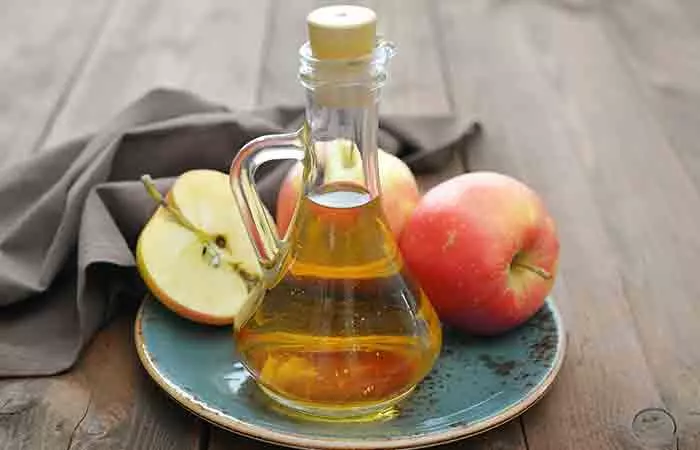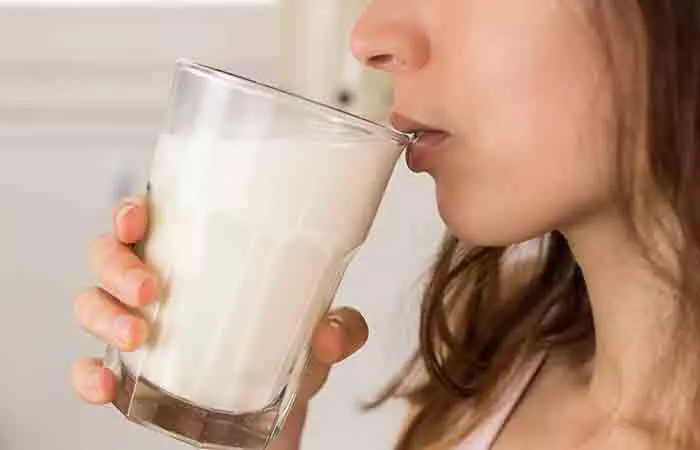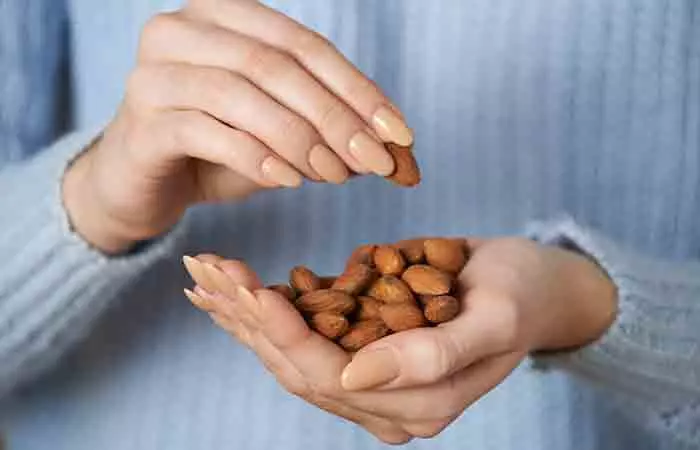Home Remedies For Burning Stomach: 14 Proven At-Home Cures
If the tummy feels on fire, your natural treatments are right there in your kitchen.

Image: iStock
Acid reflux is indicated by a burning sensation emanating from your stomach. It can even reach your chest, making you feel like your heart is on fire. Some simple home remedies for burning stomach can help alleviate the discomfort and burning sensation associated with acid reflux.

This article discusses why acid reflux happens and some common symptoms associated with this strange burning sensation in the stomach. We also share some simple cures from which you can learn on how to stop stomach burning immediately, the list of foods to avoid, and tell you when to contact your doctor. So, read on.
In This Article
What Causes Stomach Burning?
Our stomach contains acids and digestive enzymes that help break down the food and liquids we consume. The entry of food to the stomach is controlled by a valve (lower esophageal sphincter). This valve does not allow food to re-enter the esophagus or the acids from the stomach to flow into the food pipe. Acid reflux occurs when this sphincter does not close properly, and the stomach acids enter the esophagus, causing a burning sensation along with other symptoms (1), (2). It can be caused due to a variety of reasons. Common ones include:
- Overeating
- Obesity
- Increased consumption of fatty foods
- Caffeine
- Alcohol-based drinks
- Smoking
- Lying down after meals
- Stress
- Pregnancy
Scientifically, acid reflux is known as gastroesophageal reflux disease or GERD.
Many people think that a burning stomach is only caused by high stomach acid, but it can also be caused by too low stomach acid.
Key Takeaways
- Acid reflux happens when stomach acids enter the food pipe and cause a burning sensation with other symptoms like heartburn.
- Overeating, caffeine, alcohol, pregnancy, and obesity may cause acid reflux.
- Common symptoms of acid reflux are burping, difficulty swallowing, coughing, vomiting, and bloating.
- Yogurt, banana, apple cider vinegar, and milk of magnesia may help manage acid reflux.
Does IBS Cause A Burning Stomach?
Irritable bowel syndrome (IBS) is an intestinal disorder that can be triggered by hormonal changes, stress, or infections. It has several symptoms, including cramping, bloating, gas, diarrhea, nausea, mucus in the stool, constipation, and, sometimes, burning pain (2).
While IBS itself does not directly cause a burning sensation in the stomach, some people may experience it due to increased sensitivity in the gut. Hence, it is crucial to consult your healthcare provider if you are experiencing persistent pain or discomfort in the stomach.
A 2025 systematic review based on 469,899 global participants show that approximately 63,394 participants are diagnosed with GERD, resulting in an overall prevalence of 13.98%. According to the 2017 UN Revision of World Population Prospects, the global number of individuals with GERD is estimated at 1.03 billion.
 Quick Tip
Quick TipWe discussed some of the causes of a burning stomach. Let’s find out its symptoms in the following section.
Symptoms Of Burning Stomach

- Burning sensation in stomach, chest (heartburn), esophagus, and/or throat
- Nausea and vomiting
- Gas
- Burping
- Bloating
- Sore throat
- Cough or wheezing
- Hiccups
- Difficulty in swallowing (1), (2)
Certain medications may soothe the discomfort, but they can have negative side effects.
As an alternative to these medications, you can try some natural remedies to find what works best to treat your condition. But if you experience burning in the stomach frequently, we suggest you opt for prescribed medicines only.
 Did You Know?
Did You Know?The answer to heartburn and acid indigestion lies in being able to restore your natural gastric balance and function. Some remedies you can use to overcome the burning sensation in your stomach are given below.
14 Ways To Stop The Burning Sensation In Your Stomach At Home
- Apple Cider Vinegar
- Juice/Gel
- Milk
- Milk Of Magnesia
- Mastic Gum
- Tea
- Yogurt
- Baking Soda
- Banana/Apple/Papaya
- Slippery Elm
- Ginger
- Mustard
- Almonds
- Basil
1. Apple Cider Vinegar

Why This Works
It might be surprising, but when the stomach acids are burning your esophagus, ingesting more acid can actually calm it down. It regulates the acid production in the stomach and brings about balance (4).
You Will Need
- 2-3 teaspoons apple cider vinegar
- 1 tablespoon honey (optional)
- A glass of water
What You Have To Do
Mix the vinegar in water and drink this mixture.
How Often You Should Do This
Drink this whenever you experience acid reflux. If it doesn’t subside after you have a glass of this water, repeat after a few hours.
Amanda, a blogger, shares her experience of using apple cider vinegar for various purposes in her blog. One of these purposes includes keeping her gut healthy. She writes, “I have more energy, my digestion is fabulous, and generally speaking, when our tummies feel good, we feel good (i)”
2. Juice/Gel For Burning Stomach
(a) Lemon Juice
Why This Works
Lemon juice has been found to have a moderate neutralizing effect on gastric acids.
Thus, it may be of some help in reducing the burning sensation caused by acid reflux (5).
Note
If you are prone to developing heartburn, use this remedy 10-15 minutes before you have your meals as a preventive measure for acid reflux.
You Will Need
- 1 tablespoon fresh lemon juice
- A glass of warm water
What You Have To Do
Add the lemon juice to water and have this on an empty stomach.
How Often You Should Do This
Have this in the morning to get rid of the acid reflux due to that heavy meal you had last night.
(b) Aloe Vera Gel
Why This Works
Aloe vera gel contains anthraquinones that have a laxative effect.
Aloe vera is an effective home remedy for heartburn. They not only increase the water content in your intestine but also stimulate water secretion and enable easier movement of stool (6). Therefore, they may help in flushing out the acids accumulated in your stomach and causing the burning sensation.
You Will Need
1/2 cup aloe vera juice
What You Have To Do
Have the gel before a meal.
How Often You Should Do This
Consume as and when required to relieve heartburn and other symptoms.
3. Milk For Stomach Burning

Why This Works
Cold milk can neutralize the gastric acids in the stomach. Thus, it can restore the natural acid balance in the stomach, reduce acid reflux, and relieve the burning sensation caused by it. A study published in Complementary Therapies in Medicine tested how common foods, like broccoli, kale, radish, cucumber, lemon juice, cold milk, and curd, could help with acidity. Researchers compared these foods to water, baking soda, and the antacid ENO by measuring their ability to neutralize acid in a model of the stomach. Cold milk and broccoli were the most effective in reducing acidity. Their results were similar to baking soda and ENO. The study concluded that these foods can be used effectively to manage acidity naturally (5).
Caution
If you are lactose and casein sensitive, please avoid using this remedy.
You Will Need
A glass of cold milk
What You Have To Do
Drink this after your meal.
How Often You Should Do This
Have cold milk after your meals to avoid or soothe acidity problems.
4. Milk Of Magnesia
Why This Works
If you want to know how to get rid of indigestion, this ingredient is your answer. Milk of Magnesia (magnesium hydroxide) has an antacid effect on the stomach. It is also used with other medications to treat heartburn, acid indigestion, and upset stomach (7).
Caution
If you are pregnant or breastfeeding, check with your doctor before using this remedy.
You Will Need
Milk of magnesia liquid
What You Have To Do
Take as directed on the bottle.
How Often You Should Do This
Using this remedy once should give you relief from the burning sensation.
5. Mastic Gum For Burning Stomach
Why This Works
Helicobacter pylori is a type of bacteria that is said to be associated with GERD (Gastroesophageal Reflux Disease). Mastic gum may help in the eradication of H. pylori, which could be causing the burning sensation in your stomach (8).
You Will Need
Mastic gum
What You Have To Do
Chew on this gum to relieve heartburn and stomach burning.
How Often You Should Do This
Whenever you experience acid reflux, just pop one of these gums into your mouth and chew on it.
6. Tea For Burning Stomach
Why This Works
Herbal teas can calm the stomach and have anti-inflammatory properties. Thus, they may help in soothing the burning sensation in the stomach and esophagus (9), (10). Optionally, you can also add a few peppermint leaves or 1-2 drops of food grade peppermint oil to this tea as it may soothe a burning stomach.
You Will Need
- 1 green/licorice/ginger/chamomile tea bag
- A cup of hot water
- Honey (optional)
What You Have To Do
- Steep the preferred tea bag flavor in hot water for a few minutes.
- Remove the bag and drink this tea.
How Often You Should Do This
Have a cup or two in the day to keep acid reflux at bay.
7. Yogurt For Burning Stomach

Why This Works
Yogurt contains probiotics. Probiotics have been found to be effective in the treatment of reflux esophagitis and the burning and pain associated with it (11).
You Will Need
1 cup plain yogurt
What You Have To Do
Have the yogurt, preferably chilled.
How Often You Should Do This
Have a cup when you experience a burning sensation in your stomach and chest.
8. Baking Soda For Burning Stomach
Why This Works
Baking soda is the common name for sodium bicarbonate, which is alkaline in nature. It helps in the treatment of heartburn as its pH is higher than 7.0. It neutralizes the stomach acids and gets rid of the burning sensation (12).
Caution
Avoid using this remedy for more than a week at a go as it is high in salt and can lead to swelling or nausea.
You Will Need
- 1 teaspoon baking soda
- A glass of water
What You Have To Do
Dissolve the baking soda in water and drink it. You can add honey or lemon juice to enhance the taste.
How Often You Should Do This
This remedy should give you relief in a couple of minutes. Use it as and when required.
9. Banana/Apple/Papaya For Stomach Burning
Why This Works
Bananas are rich in natural antacids that act as a buffer against acid reflux. They are a rich source of potassium and help keep the level of acid production in your stomach under control. Certain elements in the fruit also help to increase the production of mucus in your stomach, which, in turn, protects it from the harmful effects of excessive acid production. As bananas and apples are high in fiber, they help speed up digestion, thus minimizing incidences of acidity (13), (14), (15).
Papaya enzymes are useful in the digestion process and may help in relieving heartburn briefly. A study published in the Neuro Endocrinology Letters journal tested the effects of a papaya-based supplement, Caricol®, on digestion. Researchers conducted a 40-day trial with volunteers who had ongoing digestive issues, such as constipation, bloating, and heartburn. The volunteers consumed either the papaya supplement or a placebo daily, and their symptoms were recorded before and after the study. The results showed that those who took Caricol® experienced significant improvements in constipation and bloating, while heartburn relief was not statistically significant due to the small number of cases. However, these benefits disappeared after stopping the supplement. The study concluded that Caricol® may help support digestive health and improve certain digestive issues. (16).
You Will Need
1 cup papaya OR 1 banana OR 1 apple
What You Have To Do
Eat any of the available fruits to get relief from acid reflux.
How Often You Should Do This
You can use this remedy for quick relief and also as a preventive measure to avoid discomfort due to the burning sensation in the stomach.
10. Slippery Elm
Why This Works
Slippery elm is a wonderful herbal remedy to treat acid reflux as it lines and soothes the mouth, throat, stomach, and intestines. It can help calm inflammatory bowel symptoms. As it stimulates the nerve endings in your gastrointestinal tract, mucous secretion is enhanced, which protects your GI tract against ulcers and excess acidity (17).
You Will Need
- 1 teaspoon slippery elm herb
- A cup of boiling water
What You Have To Do
- Steep the herb for a few minutes.
- Strain and drink this herbal tea.
Suck on a slippery elm lozenge if you cannot find the herb for the tea.
How Often You Should Do This
Have a cup or two prior to each meal.
11. Ginger
Why This Works
Ginger root is an effective therapy that helps ease a number of stomach problems – from nausea to acid reflux. It can help calm your stomach and also act as an acid buffer. It also has anti-inflammatory and anti-nausea effects (18).
You Will Need
- 3 one-inch pieces of ginger
- 2 cups of water
- Honey (to taste)
What You Have To Do
- Slice the ginger pieces and simmer them in water for about 30 minutes.
- Strain, add some honey and sip this soothing tea.
How Often You Should Do This
Drink 1-2 cups of ginger tea in the day.
12. Mustard
Why This Works
Mustard is an alkaline food. It may be a bit difficult to consume raw mustard, but its alkaline nature can help neutralize the acid that has risen in your throat (19), (20).
You Will Need
- 1 teaspoon yellow mustard
- A glass of water
What You Have To Do
Gulp down the mustard with the help of the water.
How Often You Should Do This
Have this whenever you experience heartburn and other acid reflux symptoms.
13. Almonds

Why This Works
Almonds may help alleviate the symptoms of acid reflux and dyspepsia (21).
You Will Need
5-6 almonds
What You Have To Do
Have them after anything you eat, especially after meals.
How Often You Should Do This
Do this after every meal.
14. Basil
Why This Works
The therapeutic properties of basil leaves may help provide relief from gas, acidity, and nausea (22). Those suffering from acidity frequently can keep dried and crushed basil leaves handy, which can be consumed with water for instant relief.
You Will Need
- 3-4 basil leaves
- 1 1/2 cups water
- Honey (to taste)
What You Have To Do
- Boil the basil leaves for about 10-15 minutes.
- Add honey, strain and drink this.
You can also simply wash the leaves and eat them. Be sure to chew them thoroughly.
How Often You Should Do This
Sip this tea 2-3 times a day.
Some of these remedies give instant relief while some can take a couple of minutes to show their effects. Check your pantry for the ingredients you have available and use them as recommended above. Let us now look at some practical lifestyle changes that can lessen your chance of experiencing this pain in the future. Scroll down to know.
Lifestyle Changes To Prevent Burning Sensation In Stomach
Making some lifestyle adjustments may significantly reduce the severity of acid reflux. Here are some effective strategies.
- Eat smaller, more frequent meals to reduce stomach pressure and acid production.
- Drink plenty of water to stay hydrated throughout the day, and try not to consume too much fluid during meals.
- Eat mindfully by taking your time, chewing everything, and enjoying every meal.
- Keep a food journal to find trigger foods that might result in burning sensations.
- Manage stress with techniques like yoga, meditation, or deep breathing to support digestive health.
- Maintain a healthy weight to reduce pressure on the abdomen and improve digestive health.
Avoid certain food items that are known to trigger acid reflux in many people. A list of these items is given below.
What Foods To Avoid To Prevent Burning Sensation In The Stomach
These food items are best avoided when you are experiencing a burning sensation in your stomach or if you are prone to developing acid reflux (1).
- Foods high in saturated fats, such as French fries, hash browns, onion rings, potato chips, cottage cheese, sour cream, fried cuts of meat, lard, cream-based gravies, etc.
- High acidic fruits, such as citrus fruits and tomatoes
- Chocolate
- Garlic
- Onion
- Spicy food
- Caffeine
- Alcohol
- Soda and carbonated beverages
The list given above includes common triggers for burning sensation in the stomach that can be easily eliminated from your diet.
In addition to avoiding these kinds of food, consider increasing the amount of whole foods in your diet, like veggies, whole grains, and lean proteins. These foods have the potential to enhance digestion and reduce stomach acid production.
Infographic: Top 6 Foods To Soothe A Burning Stomach
Acid reflux can be dealt with effectively with the right arsenal of kitchen ingredients. You can establish the balance between your stomach acid level by following a few home remedies.
Check out the infographic below to learn more about the foods and drinks you can consume to soothe your digestive system and relieve yourself from the burning sensation in your stomach.
Some thing wrong with infographic shortcode. please verify shortcode syntax
A burning stomach, otherwise known as acid reflux, is a condition in which acid from the stomach rises through the esophagus and is characterized by a burning sensation in the abdomen, chest, or throat. Some common causes of stomach burning include excessive smoking, eating too much fatty food or overeating, obesity, lying down after eating, caffeine intake, and stress. These home remedies for a burning stomach like apple cider vinegar, milk, some juices, fruits like papaya and bananas, green tea, slippery elm, fennel seeds, turmeric, licorice roots, etc., can help alleviate common symptoms such as bloating, heartburn, nausea, gas, and the burning sensation. To prevent acid reflux, avoid excess intake of spicy, fatty, or citrus foods.
Frequently Asked Questions
What are some long-term solutions for managing a burning stomach?
Dietary changes, consistent exercise, and stress-reduction strategies are some long-term ways to manage a burning stomach and support digestive health in general. In addition, following a regular eating schedule, drinking plenty of water, and speaking with a doctor about medication options may all ease symptoms and prevent them from recurring.
What are the warning signs of gastritis?
According to Dr. Steven Line, MD, “The warning signs of gastritis include:
• Feeling full or bloated after eating a small amount of food
• Nausea or vomiting
• Less appetite
• Weight loss
• Dark or black stools, which may indicate bleeding in the stomach or intestines.”
Is burning stomach serious?
Dr. Line says, “Whether a burning stomach is serious or not depends on the underlying cause. Some causes of a burning stomach may be relatively benign and easily treated, while others may require more extensive medical intervention.”
How long can stomach burning last?
Stomach burning may last up to 2 hours or longer. It may also return after several hours, depending on the cause.
Is lemon tea good for stomach burning?
No, lemon tea can trigger acidity. So, it is best to avoid it.
Can drinking too much water lower stomach acid?
No, drinking lots of water does not lower stomach acid. But, drinking water may help change the pH of the stomach and help relieve some symptoms (23).
Illustration: Home Remedies For Stomach Burning: Causes And Prevention

Image: Stable Diffusion/StyleCraze Design Team
References
Articles on StyleCraze are backed by verified information from peer-reviewed and academic research papers, reputed organizations, research institutions, and medical associations to ensure accuracy and relevance. Read our editorial policy to learn more.
- Symptoms & Causes of GER & GERD
https://www.niddk.nih.gov/health-information/digestive-diseases/acid-reflux-ger-gerd-adults - Gastroesophageal reflux disease, Medical Encyclopedia, Medline Plus, U.S. National Library of Medicine.
https://medlineplus.gov/ency/article/000265.htm - Irritable bowel syndrome: Pathogenesis, diagnosis, treatment, and evidence-based medicine
https://www.ncbi.nlm.nih.gov/pmc/articles/PMC4051916/ - Effectiveness of Nutritional Ingredients on Upper Gastrointestinal Conditions and Symptoms: A Narrative Review, Nutrients, MDPI.
https://www.mdpi.com/2072-6643/14/3/672 - A comparative study of the antacid effect of some commonly consumed foods for hyperacidity in an artificial stomach model, Complementary Therapies in Medicine, US National Library of Medicine, National Institutes of Health.
https://pubmed.ncbi.nlm.nih.gov/28917362/ - Pharmacological attribute of Aloe vera: Revalidation through experimental and clinical studies, Ayu, US National Library of Medicine, National Institutes of Health.
https://www.ncbi.nlm.nih.gov/pmc/articles/PMC3611630/ - Magnesium hydroxide, Drugs, Herbs and Supplements, Medline Plus, U.S. National Library of Medicine.
https://medlineplus.gov/druginfo/meds/a601073.html - The effect of mastic gum on Helicobacter pylori: a randomized pilot study, Phytomedicine, US National Library of Medicine, National Institutes of Health.
https://pubmed.ncbi.nlm.nih.gov/19879118/ - Beneficial effects of green tea: A literature review, Chinese Medicine, US National Library of Medicine, National Institutes of Health.
https://www.ncbi.nlm.nih.gov/pmc/articles/PMC2855614/ - Integrative Treatment of Reflux and Functional Dyspepsia in Children, Children (Basel, Switzerland), US National Library of Medicine, National Institutes of Health.
https://www.ncbi.nlm.nih.gov/pmc/articles/PMC4928719/ - Beneficial effect of probiotics supplements in reflux esophagitis treated with esomeprazole: A randomized controlled trial, World Journal of Gastroenterology, US National Library of Medicine, National Institutes of Health.
https://www.ncbi.nlm.nih.gov/pmc/articles/PMC6506578/ - Sodium Bicarbonate, Sodium Bicarbonate, Medline Plus, U.S. National Library of Medicine.
https://medlineplus.gov/druginfo/meds/a682001.html - Dietary fibre and health: an overview, Nutrition Bulletin, British Nutrition Foundation.
https://onlinelibrary.wiley.com/doi/full/10.1111/j.1467-3010.2008.00705.x - Short-chain fatty acids and human colonic function: roles of resistant starch and nonstarch polysaccharides, Physiological Reviews, US National Library of Medicine, National Institutes of Health.
https://pubmed.ncbi.nlm.nih.gov/11427691/ - Starches, resistant starches, the gut microflora and human health, Current Issues in Intestinal Microbiology, US National Library of Medicine, National Institutes of Health.
https://pubmed.ncbi.nlm.nih.gov/11709851/ - Papaya preparation (Caricol®) in digestive disorders, Neuro Endocrinology Letters, US National Library of Medicine, National Institutes of Health.
https://pubmed.ncbi.nlm.nih.gov/23524622/ - Slippery Elm, Herbs and Supplements, Drugs, Herbs and Supplements, Medline Plus, U.S. National Library of Medicine.
https://medlineplus.gov/druginfo/natural/978.html - The Amazing and Mighty Ginger, Herbal Medicine: Biomolecular and Clinical Aspects, The National Center for Biotechnology Information.
https://www.ncbi.nlm.nih.gov/books/NBK92775/ - Mustard and its uses in Ayurveda, Indian Journal of Traditional Knowledge, Academia.
https://www.academia.edu/2463151/Mustard_and_its_uses_in_Ayurveda - Potential benefits of pH 8.8 alkaline drinking water as an adjunct in the treatment of reflux disease, The Annals of Otology, Rhinology, and Laryngology, US National Library of Medicine, National Institutes of Health.
https://pubmed.ncbi.nlm.nih.gov/22844861/ - The Role of Diet in the Management of Non-Ulcer Dyspepsia, Middle East Journal of Digestive Diseases, US National Library of Medicine, National Institutes of Health.
https://www.ncbi.nlm.nih.gov/pmc/articles/PMC4293796/ - Ocimum sanctum Linn. A reservoir plant for therapeutic applications: An overview, Pharmacognosy Reviews, US National Library of Medicine, National Institutes of Health.
https://www.ncbi.nlm.nih.gov/pmc/articles/PMC3249909/
- A Glass of Water Immediately Increases Gastric pH in Healthy Subjects
https://www.researchgate.net/publication/5378833_A_Glass_of_Water_Immediately_Increases_Gastric_pH_in_Healthy_Subjects
Read full bio of Dr. Millie Lytle
- Dr. Steven Line, MD, is a physician with a keen focus on cosmetic medicine. He managed a private practice for two decades. He completed his education at the University of Pennsylvania and Medical College of Pennsylvania.
 Dr. Steven Line, MD, is a physician with a keen focus on cosmetic medicine. He managed a private practice for two decades. He completed his education at the University of Pennsylvania and Medical College of Pennsylvania.
Dr. Steven Line, MD, is a physician with a keen focus on cosmetic medicine. He managed a private practice for two decades. He completed his education at the University of Pennsylvania and Medical College of Pennsylvania.
Read full bio of Kushneet Kukreja
Read full bio of Arshiya Syeda
Read full bio of Dipti Sharma



























Community Experiences
Join the conversation and become a part of our empowering community! Share your stories, experiences, and insights to connect with other beauty, lifestyle, and health enthusiasts.